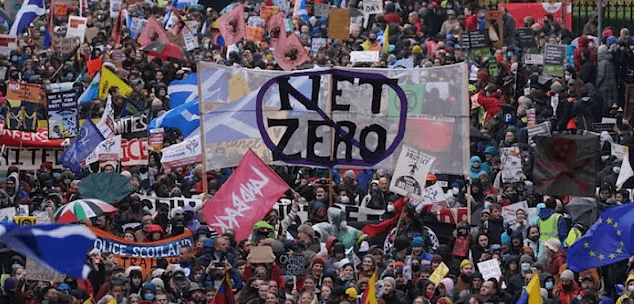Every November, the United Nations meets for the Conference of the Parties (COP) to discuss the goals of the Paris Climate Agreement and UN Framework Convention on Climate Change. The UN’s Cop26 summit has been hosted in Glasgow over the last week, introducing a feminist approach for tackling the impending global climate crisis. As environmental degradation impacts our planet, both women and people of color are disproportionately affected. According to research from the UN, Women make up 80% of the population displaced by climate change. Unequal access to land, water, food, and healthcare position women as the majority of the world’s poor and disadvantaged. This year’s Climate Change Conference brought the Feminist Green New Deal to the forefront of environmental initiatives.
Flashback to 1974, French Feminist Françoise d’Eaubonne coined “Ecofeminism” as an ecological approach to feminist theory. Solidifying the intersection of gender and environmentalism, “It [Ecofeminism] is a branch of feminism that looks at the connections between the oppression of women and the domination of nature.” Ecofeminism adopts a framework for deconstructing the historical oppression groups have faced based on race, ethnicity, sexuality, and religion. Environmental preservation requires mass change for those most affected by climate policy: women.
Developing countries are first to feel the effects of environmental disasters. Women of poverty interact closely with their environment, collecting resources like clean drinking water, livestock, and firewood for their families. Climate change impacts vulnerable women, from the elderly to pregnant mothers, in transporting goods and traveling long distances to access means for survival. Environmental sustainability, however, encompasses accessibility beyond resource collection and requires female participation in decision-making and management of nature. Gambian climate activist Fatou Jeng, founder of Clean Earth Gambia and Policy Operations lead for Women and Gender in YOUNGO, spoke at the Cop26 Gender Day Presidency event to address gender responsiveness throughout climate action. Jeng called for increased representation of women and youth globally, saying, “For us to really prioritize or tackle the climate crisis, we need to make sure that women are part of the leadership process. Only then will we be taking the crisis seriously.”
Environmentalist activism has gained momentum through social media. In 2018, a 15-year-old Swedish activist Greta Thunberg launched the school climate strike, FridaysForFuture, encouraging an international movement for young activists to protest against the lack of climate action. Young activists like Vanessa Nakate and Greta Thunberg were present at the Cop26 meetings last week, participating in the FridaysforFuture school strike. These young women utilize the power of social media to establish virtual climate communities, taking to Instagram or Twitter to insight change. In light of these progressive moments, the increased online harassment and violence towards female climate activists make the fight for climate change even more daunting. Thunberg has experienced an onslaught of online bullying from adults, most notably back in 2020 after a cartoon of the 17-year-old being sexually assaulted was circulated online. Despite these obstacles, nothing can stop these women from fighting for climate action, online and in the streets.
Throughout the Cop26 summit, on November 6th, over 100,000 people marched the streets of Glasgow to demand increased action towards fighting climate change. In attendance were major social activist groups, from environmentalist organizations like the Women Taking Action For a Healthier Planet (Wen) to Black Lives Matter protestors to Indigenous leaders from the Amazon. While many protestors denounced the conference as a lack of progress under “greenwashing,” Ugandan activist Vanessa Nakate spoke on behalf of the crowd, saying, “We must demand that our leaders stop holding meaningless summits and start taking meaningful action.”
The Feminist Agenda for a Green New Deal takes inspiration from the United States’ Green New Deal proposal while establishing a foundation in feminist principles and leadership. The agenda’s main ideas aim to confront institutional patriarchy and racism, advocate for Indigenous rights and leadership, and challenge unsustainable production methods. As the UN Climate Change Conference comes to a closure, many nations are committing to financial climate pledges that incorporate gender equity initiatives. Germany announced gender justice to be a “guiding principle” for its $5 billion International Climate Initiative. The Feminist Green New Deal works in conjunction with the initiatives displayed at the Cop26 summit, stressing the significance of women as primary recipients and leaders of grassroots movements towards environmental sustainability.
Top Photo: Screenshot / YouTube


